- Home
- Harlan Coben
Don't Let Go Page 9
Don't Let Go Read online
Page 9
He seems taken aback by this.
"It was a setup, Simon. Pure and simple."
It shouldn't have come to this--me hanging out in a parking lot making threats. I think Simon Fraser knows that now. He is more dazed now than when the car door knocked him on his ass.
"I'll get you the name."
"Good."
"I can check the billing after lunch," he says, checking his watch. "I'm late to see a client."
"Simon?"
He looks at me.
"Skip the lunch. Get the name now."
--
I'm blocking on Maura.
I'm doing it for several reasons. The most obvious, of course, is so that I can concentrate on the case at hand. Emotion will not help. I am obviously more driven on this case because of my personal connections here--you, Maura--but I can't let it cloud my brain or allow wants to twist my thinking.
In short: I can't help but hope.
There is a chance, slight as it might be, that there is a reasonable answer to all this and that when Maura and I see each other again . . . when I think of that moment, my mind goes to places it shouldn't. It goes to a future and long walks holding hands and longer nights under the sheets and then it goes to children and repainting the back deck and coaching Westbridge Little League and, yes, of course, I know how silly this all sounds and I would never voice this to anyone and perhaps again you are witnessing what I miss without you in my life.
It's crazy enough I talk to my dead brother, right?
We sit in Simon Fraser's office. The tall woman hands Simon a file. He opens it, and something comes across his face.
"What?" I say.
"I haven't hired Rex Canton in a month." Simon Fraser looks up at me, the relief washing over him. "I don't know who hired him that night, but it wasn't me."
"Maybe someone else in your firm?"
Simon hems a bit here. "I would doubt it."
"Rex worked exclusively for you?"
"I don't know about that, but at this firm, well, I'm a senior partner and the only one who works family law, so . . ."
He doesn't finish the thought, but I get it. Rex was his boy here. None of the other lawyers would dare hire him without Simon Fraser's prior consent.
My mobile rings. The caller ID reads WESTBRIDGE PD. I excuse myself and step aside.
"Hello?"
It's Augie's voice on the other end. "I think I know why we can't find Hank."
Chapter Twelve
When I arrive at Westbridge's police station the next morning, Augie is waiting there with a rookie cop named Jill Stevens. I started as a Westbridge patrolman and still work as a sort of hybrid investigator for both the county and this town. Augie brought me in and then pushed me up the ladder. I like this rung--I'm a big-county investigator with a hint of small-town cop. I have zero interest in money or glory. That's not faux modesty. I'm happy being right where I am. I solve the cases and pass on the credit. I want no further advancement or demotion. I am left alone for the most part and free of the political quicksand that sucks down so many.
I'm in my sweet spot.
The Westbridge police station is an old bank on the middle of Old Westbridge Road. Eight years ago, the new high-tech station opened on North Elm Street and flooded during a storm. With nowhere else to go during repairs, they rented space from the seen-better-days Westbridge Savings Bank, a Greco-Roman-inspired savings and loan built in 1924. It still had the bones--the marble floors and high ceilings and dark oak counters. They turned the old-school vault into a holding cell. The town council still claims that the police will move back into the North Elm Street station, but eight years later, they haven't begun construction.
We all sit in Augie's second-floor office, which used to be the bank manager's. There is nothing on the walls behind him--no artwork, no flags, no awards or degrees or citations like you see in every other police captain's office. There are no photos on his desk. To an outsider, it's like Augie's half packed for retirement already, but this is my mentor. Awards and citations would be boasting. Artwork would be sharing himself in ways he'd rather not. Photos . . . well, even when Augie had family, he didn't want to take them to work.
Augie is behind his desk. Jill sits to my right holding a laptop and a file.
Augie says, "Three weeks ago, Hank came in with a complaint. Jill here took his statement."
We both look at Jill. She clears her throat and opens the file. "The complainant presented himself as very agitated when he entered."
Augie says, "Jill?"
She looks up.
"You can skip the formal talk. We're all friends here."
She nods and closes the file. "I've seen Hank around town. We all know his reputation. But I just checked the records. Hank has never come to this station before. Well, let me correct that. I mean, he's never voluntarily come in. We've picked him up when he acts out, just held him for a few hours until he calms down. Not in a holding cell. Just a chair downstairs. What I mean is, he's never come in to file a complaint."
I try to move this along. "You said he was agitated?"
"I've witnessed his rantings before, so at first I was just sort of humoring him. I figured he needed to vent and that he would calm down. But he didn't. He said people were threatening him, yelling things at him."
"What kind of things?"
"He wasn't clear, but he seemed genuinely scared. He said people were lying about him. Every once in a while, he'd take on a weird studious tone and start talking about defamation and slander. Like he was his own lawyer or something. The whole thing was bizarre. Until he showed us the video."
Jill scooches her chair closer to me and opens the laptop.
"It took a while for Hank to make sense, but eventually he showed me this." She hands me the laptop. There's a still for a video on Facebook. I can't make out what it is yet. A forest maybe. Green leaves from trees. My eyes travel up. The heading of the video shows the name of the page where it'd been posted.
"Shame-A-Perv?" I say out loud.
"The Internet," Augie says, as if that explains everything. He leans back and folds his hands on his paunch.
Jill clicks the play button.
The video starts off shaky. The moving images are narrow with blurry sides, meaning it was shot on a smartphone held vertically. In the distance, I can make out a man standing alone behind the backstop of a baseball diamond.
"That's Sloane Park," Jill says.
I'd already recognized it. It's the field adjacent to Benjamin Franklin Middle School.
The video jerkily zooms in on the man. No surprise--it's Hank. He looks like what you used to call a hobo. He is unshaven. His jeans are loose and faded to the point of near white. He wears a flannel shirt unbuttoned to reveal a once-white, moth-ravaged (one hopes) undershirt.
For a second or two, nothing happens. The camera seems to settle its jitters and come into focus. Then a woman--probably the one doing the filming--whispers, "This dirty pervert exposed himself to my daughter."
I glance at Augie, who remains stoic. Then I turn my attention back to the screen.
Judging by the up-and-down motion and the way the video is closing in on Hank, I assume the woman doing the filming is walking toward him.
"Why are you here?" the woman shouts. "What do you think you're doing?"
Hank Stroud sees her now. His eyes go wide.
"Why are you exposing yourself to children?"
Hank's eyes dart about like scared birds trying to find a place to land.
"Why do our police allow perverts like you to endanger our community?"
For a second Hank puts his hands up to his eyes as though blocking a bright light that doesn't exist.
"Answer me!"
Hank bolts away.
The camera pans to follow him. Hank's pants start to slip. He holds them up with one hand and continues to run toward the woods.
"If you know anything about this pervert," the woman making the video says, "please post it. We n
eed to keep our children safe!"
The video ends on that note.
I look up at Augie. "Did anyone complain about Hank?"
"People always complain about Hank."
"That he exposed himself?"
Augie shakes his head. "Just that they don't like the looks of him, walking around town, disheveled, he smells, he talks to himself. You know the deal."
I do. "But never anything about exposing himself?"
"Never." Augie gestures toward the laptop with his chin. "Take a look at the view count at the bottom of the video."
My jaw drops: 3,789,452 views. "Whoa."
"It went viral," Jill says. "Hank came in here the day after it was uploaded. There were already half a million hits."
"What did he want you to do?" I ask her.
Jill opens her mouth, thinks about it, closes it. "He just said he was scared."
"He wanted you to protect him?"
"Yeah, I guess."
"And what did you do?"
Augie says, "Nap."
Jill shifts in her seat. "What could I do? He was so vague about everything. I told him to come back if there was a specific threat."
"Did you look into who posted the video?"
"Uh, no." Jill looks wide-eyed at Augie. "I put the file on your desk, Captain. Should I have done more?"
"No, you did fine, Jill. I can take it from here. Leave the laptop. Thanks."
Jill looks at me as if I'm supposed to say something to absolve her. I don't blame her for the way she handled it, but I'm not in the mood to let her off the hook, either. I stay quiet as she leaves. When we are alone, Augie frowns at me.
"She's a rookie, for crying out loud."
"Someone on that video is accusing Hank of a pretty serious offense."
"Put it on me, then," Augie says.
I make a face and wave him off.
"I'm the captain. My subordinate left the file on my desk. I should have gone through it better. You want to blame somebody? Blame me."
Right or wrong, this isn't where I want to go with this. "I'm not blaming anybody."
I hit the play button and watch the video again. Then I watch it a third time.
"His pants are loose," I say to him.
"You think maybe they slipped?"
I don't. Neither does he.
"Check out the comments underneath," Augie says.
I move the cursor down. "There are over fifty thousand of them."
"Just click 'Top Comments' and read a few."
I do as he asks. And as always when reading a comments section, my faith in humanity plummets: SOMEONE SHOULD CASTRATE THIS GUY WITH A RUSTY NAIL . . .
I WANT TO CHAIN THAT PERV TO THE BACK OF MY TRUCK AND DRAG HIS ASS . . .
THIS IS WHAT'S WRONG WITH AMERICA. WHY IS THIS PEDO-O-FILE ROAMING FREE . . .
HIS NAME IS HANK STROUD! I SAW HIM PEEING IN THE PARKING LOT AT THE WESTBRIDGE STARBUCKS . . .
WHY WASTE MY TAX DOLLARS BY PUTTING THAT DEVIANT IN A PRISON? TAKE THIS HANK OUT BACK LIKE YOU WOULD A RABID DOG . . .
HOPE THAT FREAK WALKS THROUGH MY YARD. GOT A NEW RIFLE I'M DYING TO TRY OUT . . .
SOMEONE SHOULD PULL DOWN HIS PANTS, BEND HIM OVER AND . . .
You get the idea. Too many posts begin with "Someone should . . ." and then offer up a skew of torture possibilities so creatively sick that Torquemada would have been envious.
"Nice, huh?" Augie says.
"We need to find him."
"I put out a bulletin statewide."
"Maybe we should try his dad."
"Tom?" Augie looks surprised. "Tom Stroud moved away a long time ago."
"Rumor has it he came back," I say.
"For real?"
"Someone told me he's living in his ex's place in Cross Creek Point."
"Huh," Augie says.
"Huh what?"
"We were pretty tight in the day. Tom and I. After the divorce he moved out to Wyoming. Cheyenne. A couple of us went out there, oh, has to be twenty years ago, and took a fly-fishing trip with him."
"When was the last time you saw him?"
"That trip. You know how it is. A guy moves across the country, you lose touch."
"Still," I say. "You just said you two were pretty tight."
I look at him. Augie gets where I'm going with this. He looks down at the main floor of the station. It isn't busy. It rarely is.
"Fine," he says with a sigh, heading for the door. "You drive."
Chapter Thirteen
We drive in silence for a few minutes.
I want to say something to Augie. I want to apologize for unearthing what he'd worked so hard to bury. I want to tell him that I'm going to turn around, that I'm going to drop him back off at the station, that I can handle this entirely on my own. I want to tell him to call Yvonne and maybe give it one more try and forget I said anything about his dead daughter.
But I don't.
Instead I say, "My theory isn't adding up anymore."
"How's that?"
"My theory--if you want to call it that--was that this all has to do with what happened to Leo and Diana."
Out of the corner of my eye, I can see Augie deflate. I push on.
"I figured that it has something to do with that Conspiracy Club. Six possible members that we know of--Leo and Diana--"
"We don't know Diana was a member." There is a snap in his voice, which I completely get. "She wasn't wearing one of those silly pins in the yearbook."
"Right," I say slowly, carefully. "That's why I said possible members."
"Fine, whatever."
"If you don't want me to talk about this--"
"Do me a favor, Nap. Just tell me what's now wrong with your theory, okay?"
I nod. As the two of us get older, we get more equal. But Augie is still the mentor, I the mentee. "Six possible members," I say again. "Diana and Leo--"
"--are dead," he says. "So is Rex. That leaves Maura, who was at the scene of Rex's murder, that cardiologist out west--"
"Beth Fletcher nee Lashley."
"And Hank," Augie says.
"And he's the problem," I say.
"How so?"
"Three weeks ago, before Rex was murdered, someone posted that viral video of Hank. Then Hank goes missing. Then Rex gets killed. I don't see how there can be a connection. Whoever posted the video--that was a random thing by a school parent. That can't be connected to the old base or the Conspiracy Club, right?"
"Seems unlikely." He rubs his chin with his right hand. "May I make an observation?"
"Shoot."
"You want this too much, Nap."
"And you don't want it enough," I fire back, which is a dumb thing for me to say.
I expect and deserve fireworks. Instead Augie chuckles. "Anyone else, I'd punch them in the mouth for that."
"That was out of line," I say. "I'm sorry."
"I get it, Nap, even if you don't."
"What are you talking about?"
"You aren't just in this because of Leo and Diana," he says. "You're in it for Maura."
I just sit and let the words sting.
"If Maura hadn't run off, you'd have been able to put Leo's death behind you. You'd have questions, of course, like I do. But that's the difference here. Whatever answer we come up with, even if it changes what we know about Leo and Diana, it doesn't really change anything for me. My daughter's dead body will still be rotting in that cemetery. But for you"--there is a deep sadness in Augie's voice, and I think it may be pity for me--"for you, there's Maura."
We pull up to the gate in front of the condo development. I shake it off. Focus. Concentrate.
It is easy to poke fun at these sorts of real estate developments--the placid sameness, the lack of any sense of individuality, the snap-together structuring, the overly orchestrated landscapes--but I've thought of moving into one ever since I reached adulthood. The idea of paying one monthly maintenance fee and doing no exterior work appeals to me. I hate to mow the lawn. I don't like
to garden or barbecue or do any of the classic homeownership rites of passage. I wouldn't care in the slightest if the exterior of my home looked exactly the same as my neighbors'. I don't even feel any special connection to the physical structure where we were raised.
You, Leo, would stay with me wherever I would go.
So why don't I move?
I'm sure a psychiatrist would have a field day with that one, but I don't think the answer is that deep. Maybe it's easier to stay. Moving is an effort. Classic science: A body at rest stays at rest. I don't buy that explanation, but it's the best I've got.
The condo guard is armed with nary a nightstick. I flash my badge at him and say, "We're here to see Tom Stroud."
He studies the badge, hands it back to me. "Is Mr. Stroud expecting you?"
"No."
"Do you mind if I call and let him know you're here? I mean, it's kinda policy."
I look at Augie. Augie nods. I say, "No problem."
The guard places the call. He hangs up, gives us directions to make the second left past the tennis courts, and sticks a parking pass on the windshield. I thank him and drive.
Tom Stroud is standing by an open door as we pull up. It's odd when you see the echo of the son in the father. There is no doubt he's Hank's father, but in a bizarre-world way. Yes, he's obviously older, but he's also better dressed, shaved, groomed. Hank's hair sticks up as though it's a science experiment gone wrong. His father is perfectly coiffed, the gray slicked down and parted by a divine entity.
As we open our car doors, Tom Stroud is wringing his hands. He rocks back and forth. His eyes are a little too open. I glance at Augie. He sees it too. This is a man expecting bad news, the worst sort of news. We have both delivered news of that sort--and, of course, we've both been on the receiving end.
Tom Stroud takes a shaky step forward. "Augie?"
"We don't know where Hank is," Augie says. "That's why we're here."
Relief floods his face. His son is not dead. Tom Stroud ignores me and heads toward Augie. He opens his arms and embraces his old friend. Augie hesitates for a second, almost recoiling in pain, before relaxing and hugging him back.
"It's good to see you, Augie," Tom Stroud says.
"Same, Tom."
When they let go, Augie asks, "Do you know where Hank is?"
Tom Stroud shakes his head and says, "Why don't you come inside?"
--
Tom Stroud makes us coffee with a French press.
"Doris liked to use one of those K-Cup machines, but I think the coffee ends up tasting like plastic." He hands me a cup, then Augie. I take a sip. It's excellent, by the way--or maybe it's my Francophile bias popping up again. Augie and I sit on stools in the small kitchen. Tom Stroud stays standing. He looks out a window that faces a building that looks exactly like this one.

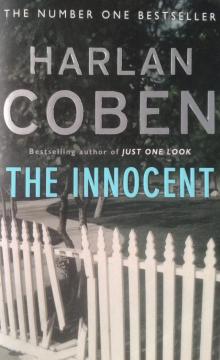 The Innocent
The Innocent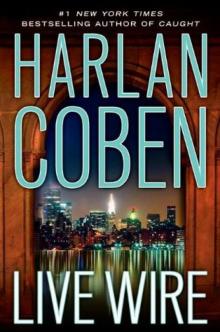 Live Wire
Live Wire Play Dead
Play Dead Drop Shot
Drop Shot Seconds Away
Seconds Away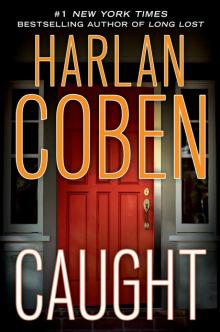 Caught
Caught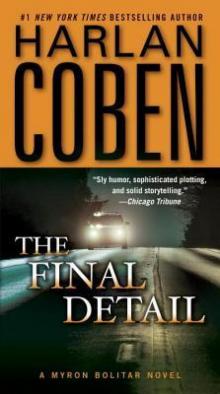 The Final Detail
The Final Detail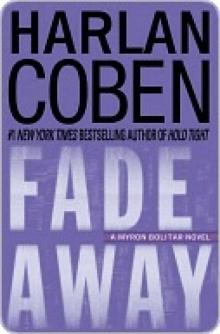 Fade Away
Fade Away Home
Home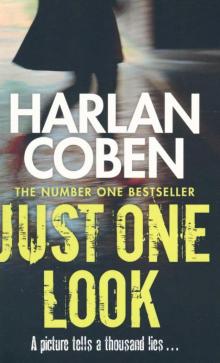 Just One Look
Just One Look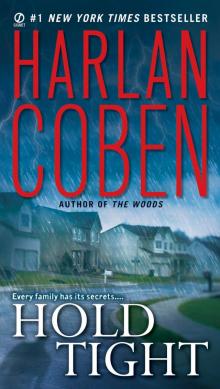 Hold Tight
Hold Tight Fool Me Once
Fool Me Once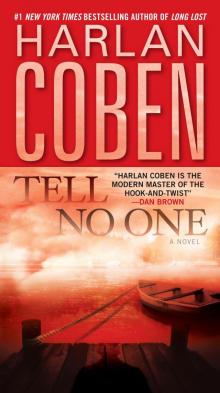 Tell No One
Tell No One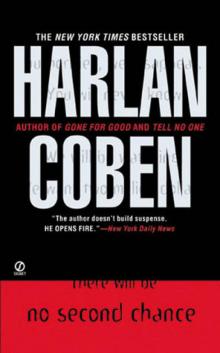 No Second Chance
No Second Chance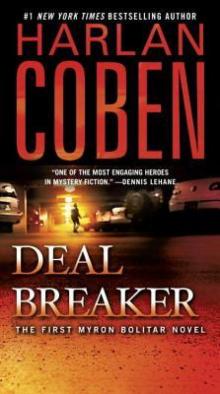 Deal Breaker
Deal Breaker Long Lost
Long Lost One False Move
One False Move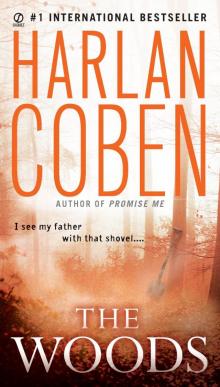 The Woods
The Woods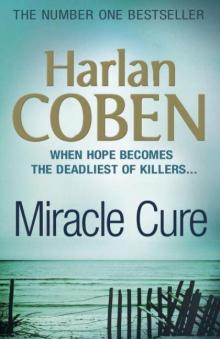 Miracle Cure
Miracle Cure Found
Found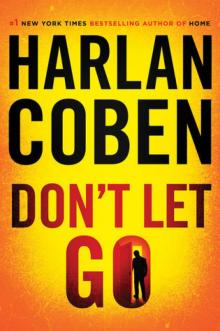 Don't Let Go
Don't Let Go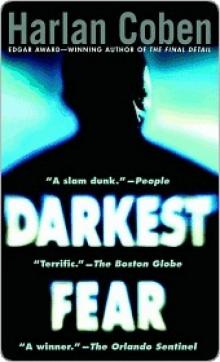 Darkest Fear
Darkest Fear The Stranger
The Stranger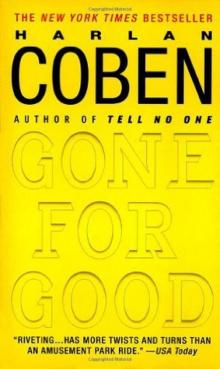 Gone for Good
Gone for Good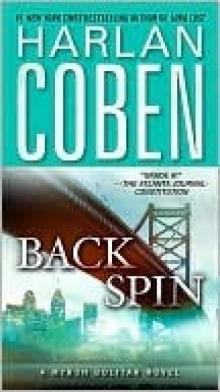 Back Spin
Back Spin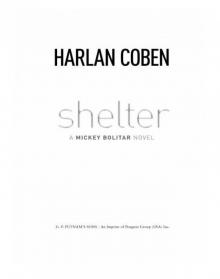 Shelter
Shelter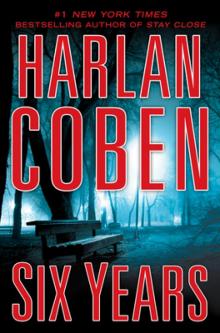 Six Years
Six Years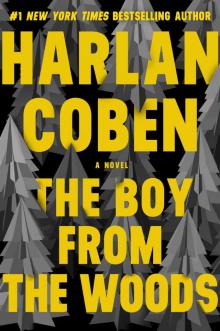 The Boy from the Woods
The Boy from the Woods Missing You
Missing You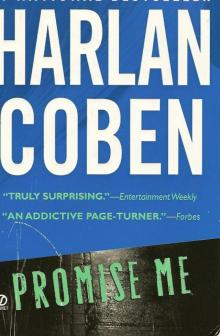 Promise Me mb-8
Promise Me mb-8 The Final Detail: A Myron Bolitar Novel
The Final Detail: A Myron Bolitar Novel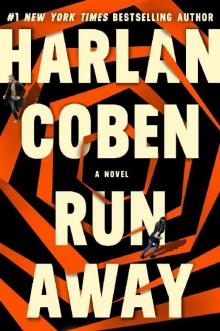 Run Away
Run Away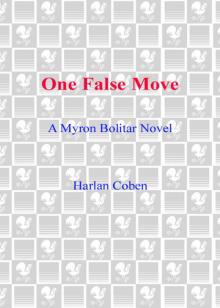 One False Move: A Myron Bolitar Novel
One False Move: A Myron Bolitar Novel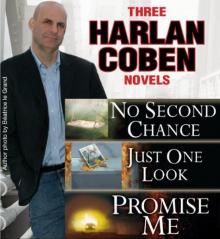 Three Harlan Coben Novels
Three Harlan Coben Novels the Woods (2007)
the Woods (2007) Tell No One (2001)
Tell No One (2001) the Innocent (2005)
the Innocent (2005)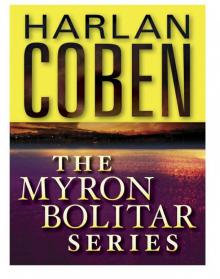 The Myron Bolitar Series 7-Book Bundle
The Myron Bolitar Series 7-Book Bundle Gone for Good (2002)
Gone for Good (2002) Caught (2010)
Caught (2010) Hold Tight (2008)
Hold Tight (2008)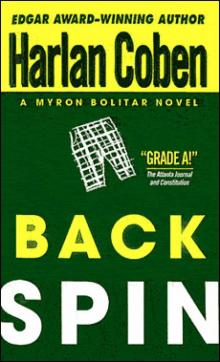 04 - Back Spin
04 - Back Spin Miracle Cure (1991)
Miracle Cure (1991) Harlan Coben 3 Novel Collection
Harlan Coben 3 Novel Collection Just One Look (2004)
Just One Look (2004)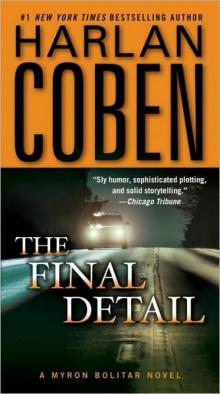 The Final Detail mb-6
The Final Detail mb-6 Play Dead (2010)
Play Dead (2010)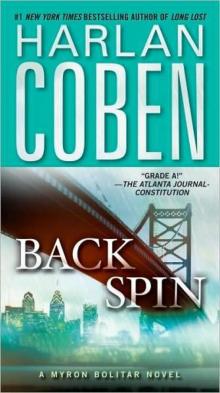 Back Spin mb-4
Back Spin mb-4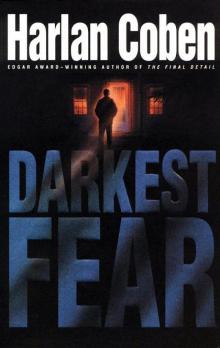 Darkest Fear mb-7
Darkest Fear mb-7